WORD 完美格式编辑专业资料整理限制性定语从句与非限制性定语从句的区别限制性定语从句提供有关主语或宾语的重要信息,起限定作用, 与被修饰部分的关系紧密,如果省略该从句会使主句语义表达不完整。例如:This is the very person thatis wanted by the police. He is the man who /that lives next door. It was a meeting whose importance I did not realize at the time. 非限制性定语从句只是用来对被修饰部分作补充性的说明,与先行词关系比较松散,先行词与从句间可以用逗号隔开,从句可略去:He will not be able to spend the holiday with his family, whichis a big annoyance to him. The minister, who is to visit our university, is said to be a Qinghua University graduate. The book, which your sister bought you in Xinhua Bookstore, is very useful in improving your spoken English. The businessman, whose suitcase has been found by a stranger , has left for Beijing. 如果定语从句的先行词是专有名词或是带有形容词性物主代词(my, his, etc) 或形容词性指示代词 (this, that, etc)作限定词的名词词组,其后的定语从句通常为非限制性的。例如:The Thames, which is now clean enough to swim in, was polluted for over a hundred years. My mother , who has been on a visit to Australia, will fly back tomorrow. All of thesebooks, whichhave been donated by visiting professors , are to be used by the children in Hope School. 限制性定语从句的先行词只能是名词,代词或名词性词组, 而非限制性定语从句的先行词除了是名词及名词性词组外,还可能是句子的一部分或是整个句子。例如:They say he plays truant, which he doesn ’t . [which 指代 plays truant] The meeting was put off till next month, as we hoped. [as指前面的句子 ] 下面的表格归纳了前面已提到的两者不同之处:WORD 完美格式编辑专业资料整理表一: 限制性定语从句与非限制性定语从句的区别限制性定语从句非限制性定语从句1.提供确定或限定主句中某个名词的信息。1.提供对确定主句中某个名词的非主要附加信息。2.由...


